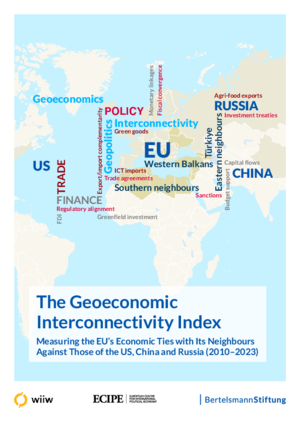The Geoeconomic Interconnectivity Index: Measuring the EU’s Economic Ties with Its Neighbours Against Those of the US, China and Russia (2010–2023)
Vasily Astrov, Fredrik Erixon, Mahdi Ghodsi, Meryem Gökten, Richard Grieveson, Branimir Jovanović, Philipp Lamprecht, Thieß Petersen, Olga Pindyuk, Thomas Schwab, Elena Sisto, Erik van der Marel and Stefani Weiss
Joint Study No. 2025-09, September 2025
in cooperation with Bertelsmann Stiftung and ECIPE
56 pages including 34 Figures
The Geoeconomic Interconnectivity Index (GEOII) measures for the first time, on the basis of 43 indicators grouped into the sub-indices trade, finance and policy, how closely the EU is interconnected with its neighbourhoods. It also compares these results with the performance of the United States, China and Russia in the same regions.
In today’s international environment, where economic relations are increasingly used as instruments to exert power, secure influence and advance strategic interests, the GEOII provides a new, data-driven tool for political analysis and strategy. The index will be updated annually.
The results for the period 2010–2023 show that the EU remains the most interconnected actor across its neighbourhoods – from the Western Balkans to the Eastern neighbours, Türkiye and the Southern Mediterranean. Since 2021, however, it has been losing ground. China is steadily gaining in key areas such as high-technology trade and investment. Russia continues to play a major role through energy and agri-food supplies, while the already limited economic presence of the United States has declined further.
The GEOII highlights where Europe needs to adjust and where it still holds an unrivalled position. It offers a solid basis for a strategic neighbourhood policy that can strengthen the EU in a contested geopolitical environment. Crucially, Europe must use its interconnectedness more decisively in line with its interests and values. Only by developing real shaping power in its neighbourhood can the EU act as a global player – rather than risk becoming a pawn in the new age of geopolitics.
The GEOII is a joint project by Bertelsmann Stiftung, the Vienna Institute for International Economic Studies (wiiw) and the European Centre for International Political Economy (ECIPE).
Keywords: Geoeconomics, global powers, EU neighbourhood, interconnectivity index, economic integration, international trade, global value chains, international lending, FDI, economic policy
JEL classification: F15, F16, F21, F34, F36, F51, F52, F53, N7
Countries covered: Albania, Algeria, Armenia, Azerbaijan, Belarus, Bosnia and Herzegovina, China, Egypt, EU neighbouring countries, European Union, Georgia, Israel, Jordan, Kosovo, Lebanon, Moldova, Montenegro, Morocco, North Macedonia, Palestine, Russia, Serbia, Tunisia, Turkey, Ukraine, US, Western Balkans
Research Areas: International Trade, Competitiveness and FDI
Press Releases
Related News
- The EU is gaining influence in Eastern Europe, but losing ground to China in North Africa and Turkey
